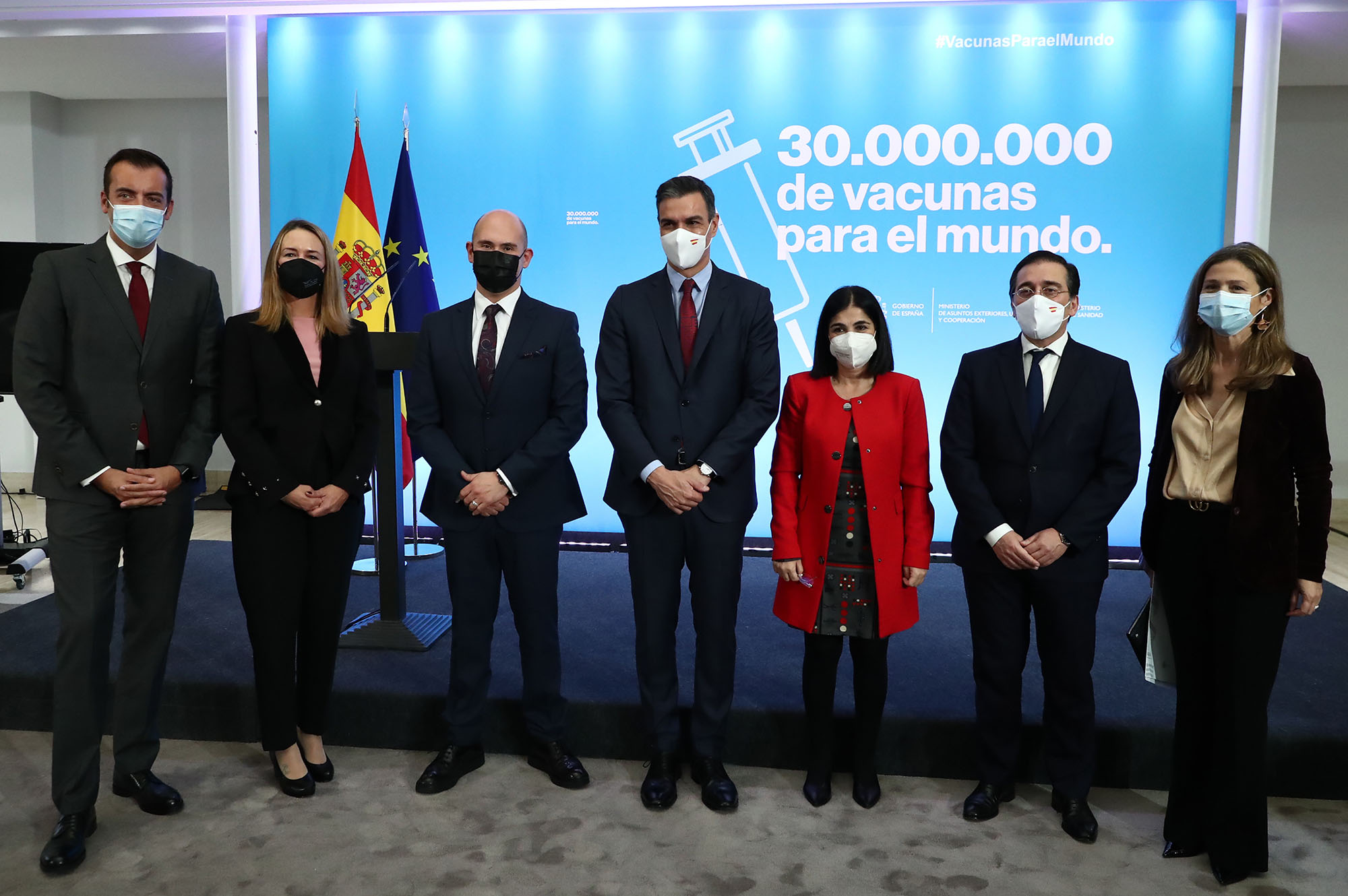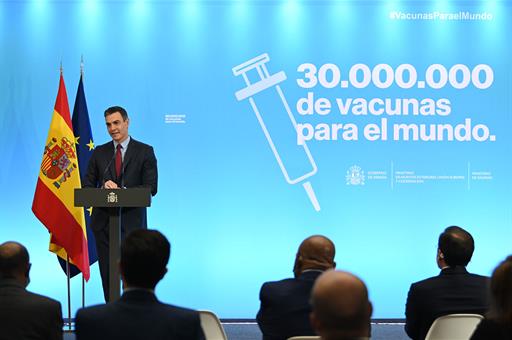Sanchez announces that Spain has fulfilled its commitment to donate 30 million vaccine doses against COVID-19 in 2021
President's News - 2021.11.22
Moncloa Palace, Madrid
During the event, Sánchez announced that Spain has met its commitment to donate 30 million doses of the COVID-19 vaccine and to share knowledge by releasing a patent on the virus detection test developed by the Spanish National Research Council (CSIC).
The President of the Government of Spain said: "We are in a position to show that you can lead national vaccination and lead global vaccination at the same time, and we can be proud of that. Because we have achieved three major objectives in record time.
The Government of Spain has managed to donate more than 30 million doses of the COVID-19 vaccines to COVAX before the end of 2021 - of which more than 7.5 million have reached Latin America - and to share knowledge for the advancement of science and society. Therefore, Spain has released the patent of the CSIC serological test to detect the virus. Spain, which has already started administering the third dose to those over 60 years old and to health and social care workers, has 89% of the population over 12 years old fully vaccinated.
"The key to this has been that the EU made a centralised purchase of vaccines, that Spain has a great National Health System, that the communities have worked in tandem with the government in a great example of co-governance, that our health professionals have set an example with their effort and commitment and that Spaniards have carried out a great exercise of responsibility by vaccinating en masse and trusting in science and in this national health system," the president stressed.
Spain has also pledged to continue donating vaccines to reach 50 million doses by the first quarter of 2022. "Latin America, our sister region, has been prioritised, and we are now putting a lot of effort into the Southern neighbourhood and sub-Saharan Africa, our neighbouring region. We will do all we can to provide vaccines to those in the most vulnerable situations: people living in humanitarian corridors. It is an ethical and moral obligation, so we will donate more than 2 million doses in these contexts".
The World Health Organization has set a target of vaccinating 40% of the world's population by the end of 2021 and 70% by the middle of 2022. In this sense, Sánchez pointed out that "until we are all safe from the virus, we will not be truly protected. Solidarity is not a territorial issue, but a humanitarian one. Faced with a global health problem, the response must be coordinated and multilateral".
The event was attended by the Director of the Spanish Agency for Medicines and Health Products, María Jesús Lamas; the CEO of COVAX, Seth Berkley; the European Commissioner for International Partnerships, Jutta Urpilainen; the President of AstraZeneca Spain, Rick R. Suarez; and the Director General of the WHO, Thedros Adhanom Ghebreyesus. During the event, Thedros congratulated Spain for being the fifth country in the world in terms of delivery solidarity vaccines and encouraged other countries to follow Spain's example.
 Foto: Pool Moncloa/Fernando CalvoSpain shares technology and knowledge on COVID-19
Foto: Pool Moncloa/Fernando CalvoSpain shares technology and knowledge on COVID-19
Spain - committed to universal access to vaccines - presented 'Vaccines for All' non-paper at the EU Social Summit in Porto, focusing on three pillars: sharing knowledge, increasing vaccine production and accelerating vaccine distribution.
"We need to maximise global vaccine production capacity, ensure well-functioning supply chains, remove trade barriers and logistical obstacles, and ensure sufficient transport, storage and distribution capacity," insisted Sánchez.
For this reason, Spain has reached an agreement with the World Health Organization to openly license a test for COVID-19 developed in Spain by CSIC scientists. The technology, which is able to differentiate antibodies produced by vaccination from those produced by COVID-19 infection with 99% reliability, could be a very useful diagnostic tool for countries with fewer resources.
"The pandemic has made it clear that the only way to act in these times in the face of the great challenges we face is unity. Unilateral positions will not work if we are to respond effectively to challenges such as climate change or future health crises. The fair and equitable distribution of vaccines is key and universal access to health is the guarantee of our global future," concluded the President of the Government of Spain.
Non official translation





